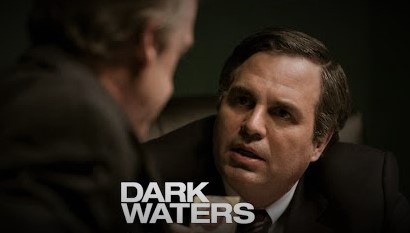
The film had ended and I knew it wasn’t any ordinary selfish corporate entity poisoning water muckraker. I had been riled up and entertained by “Erin Brockovich” and enlightened by the underrated “A Civil Action” in the past. But as I toddled out of the theater exit doors, I stumbled onto a bench and looked out. I had looked out at the parking lot slopes and malls beyond, and looked some more. Perhaps I was waiting for another person who just saw Dark Waters to come by so we could strike up a conversation about it. I waited, but got cold. I went to my car, but I felt paralyzed. I was unable to start the car. Usually I see a movie, and I’m in a mandatory rush to get back to whatever real thing I got going. Obligations, responsibilities, errands. But I realized I was too shook up to drive. I have been shaken before at the end of “Detroit” in 2017, or “Elephant” in 2003. I succumbed to just sit there, which I relented and permitted myself to. I had plenty to think about, and after a half hour to compose my thoughts, only then was I ready to start the ignition and move on.
We already have enough issues to concern ourselves with in contemporary times. A current President who obstructs justice, our country’s broken agreement with Geneva convention, caged children at the border, foreign powers influencing the divide of political parties in-country. Bombarded by everything happening, I didn’t go into Dark Waters thinking it would be the most important movie of the year. But stunningly, it is about a real life case of corporate malfeasance at the highest levels that by the end seems to, in reckoning, tie together with every major problem going on, I believe.
I imagine everyone involved with the making of the film must have thought, This Is Going To Be Unpopular, but it has to be said and the appalling message must be spread.
Mark Ruffalo (who also served as producer) as Robert Billot has a prestigious attorney job for a dreamy wood paneled and high floor window West Virginia firm. He falls into a case representing an uneducated farmer with a redneck vernacular (Bill Camp, and I don’t want to get too caught up discussing the acting but what a searing performance he gives; likely to go unnoticed by awards circuits), who claims that the livestock of his that has been dying is due to contamination waste dumped from DuPont.
That’s a toxic pollutants in waters issue, which in itself, is enough to fire your anger even if you’ve been dragged through that similar story before. But no, the scandal and impropriety runs much deeper than that, and before Dark Waters is over, you’re sure that you and everyone you’ve ever known has been poisoned at one point of your life or another. What’s at stake is all inter-connected.
This is one of those legal dramas where the lawyer digs through countless files before he comes up what he’s looking for, and Dark Waters does an exceptional task at constructing — we see the case building its significance before our eyes. Billot discovers what PFOA or C8 is, it’s a hard to destruct and impervious chemical that was created for military tanks until in 1962 the chemical process was adopted by DuPont to instill in everyday items. First things first: You will see this movie and throw out all Teflon items from your kitchen, pronto.
Long-gestated EPA reports finally were released that linked over exposed volumes of PFOA with kidney cancer, testicular cancer, thyroid disease, high cholesterol, ulcerative colitis, etc. after DuPont toxic chemicals, through their products, found a way to pervade American life.
For many who worked at their factories, they developed fast-acting cancer and birth defects in their offspring. The film has one failure: To deny telling us what kind of neurological effects exposure to PFOA has on brain activity. I wonder why people fail to vote smartly in this country, or have the lack of cognition to understand certain proposition measures that will disadvantage themselves with the wrong vote, or wonder why some people lack empathy. Perhaps it is because PFOA has compromised brain development in young minds?
Back to ordinary movie critiquing…. Yes, when it comes to story structure and form Dark Waters has the same ingredients as many that come before it. Billot has a nagging and skeptical wife played by Anne Hathaway, and he has children that he ignores. The family members have their arcs and eventual positive input. Billot has rapport with the little guys in this world whom are either disciples for the cause or in their impatience castigate this lawyer with ingratitude even after all the work that he puts in on the case with the complaint that he has not done enough.
Dark Waters was directed by Todd Haynes following a career of either avante-garde experiments (“I’m Not There”) or disheartening character studies of non-conformists trapped in a rigid past era (“Carol”). My initial first hour impression was Haynes has brought a workmanlike ethic to a fight the system populist message movie. That is only deceptively so. As it unfurls into the second hour, Dark Waters blackens and compresses its hero into tighter spaces, and Haynes enshrouds a certain nagging paranoia not just around our hero but to taint everything, I mean everything, so we feel the significance of the entire society/environmental/industrial corrupt web, i.e., this particular story itself is a microcosm for all that ills from corporate and political craven greed. The yukkiness of what Dupont and other companies like them have done is there and it can not be shaken off, wedded with a helplessness and exhaustion that even a good deed lawyer is adrift in a neverending fight.
To say Dark Waters is a must see call to arms must make me sound like I’m one of those the sky is falling kind of liberal virtue signalers. I don’t want to be mistaken for the shallow version of that guy. Here, I just want to bluntly say, see this movie and decide for yourself if it’s important. Or maybe I want more people to see this because I just don’t want to be alone in my anger.
127 Minutes. Rated PG-13.
DRAMA / MATURE TEENS / AFTERNOON DEEP FOOD FOR THOUGHT
Film Cousins: “Silkwood” (1983); “Safe” (1995); “A Civil Action” (1998); “The Insider” (1999); “Erin Brockovich” (2000); “The Corporation” (2003).
Jean-Louis Trintignant did the best acting of his life when he was older, in the titles “Red” (1994) and “Amour” (2012). He had a quavering unease and decipherable frostiness about him, as a result, we could see into the fragility of his soul. We see nothing into him in his early roles, especially not into his lead protagonist of the 1970 Italian drama <em>The Conformist</em>. All we get is a black hole. Which, true, is likely what Bernando Bertolucci was going for. However, the protagonist is so implacable that we don’t get under the skin to the motivations, or thought processes, of what’s harboring him. As much as future audiences needed a film that took a look with rising fascism and life under dictator Benito Mussolini in 1938 Italy, the script for this is an overly busy scramble with much snooty huff and puff spoken by quasi-intellectuals.
I know it is considered a foreign film high watermark for cinephiles, but for me, all its assets I can admire only in the abstract. Yes, there are great images honed by Vittorio Storaro, with its aristocratic and decadent sheen; yet, the photography, while striking and golden-hued, is not luminous in helping unlock the meaning of the story. Yes, the ending is an unsettling hit in the forest. But the despite the angle that Marcello Clerici is a burgeoning conspirator and murderer, most of the story building around that is amorphous and detached.
What we needed in the world was more like William Friedkin’s “The French Connection.” Or so I thought. <em>The Seven-Ups</em> came out two years after the Friedkin film, was made by Philip D’Antoni (producer of the Friedkin film and “Bullitt”), features Roy Scheider in the lead cop role, and even has overheated aural tones that tries to capture the same feeling of his earlier successes. Only it feels labored. Scheider shouts about intermittently, wears either a tight waffle crew cut or a turtleneck with a leather jacket over it, and that look and attitude defines his entire character. What entails is a cop conspiracy and mob extortions. What did I find in this? Several above-adequate scenes and one sensational car chase which smartly uses fixed bumper cameras, whiplash cuts, diagetic sounds as well as a piercing final crash.
<blockquote><em>“See, Mr. Gittes, most people never have to face the fact at the right time and the right place, they’re capable of anything.”</em> – Noah Cross</blockquote>
Best screenplay ever written, courtesy of Robert Towne. Adulterers, imposters, bribery, corruption, water dumping, droughts, real estate, aberrant sexual histories, and Jake Gittes (Jack Nicholson) as a private eye who has his nose slashed after snooping into everything too smartly.
Gittes is ever so diligent in bringing respectability to his profession, even when most of his assignments involve sexual infidelity work. Gittes falls into something more complicated, and he is miffed by the fact that somebody is trying to pull one over him. Evelyn Mulwray (Faye Dunaway) enters the picture and threatens to sue him for disgracing her husband, a water works magnate, for publicity. They will soon pair up to uncover other avenues of malfeasance and corruption, as disposed by associates and crooked men of power.
<em>Chinatown</em> is not a film of poetic justice, but of poetic noir revelation. Dishonest people step-up, assume power, afflict burden onto others. Noah Cross (John Huston) in particular makes vile and cynical statements, and never loses his cold composure. Some irony ensues where some real estate victims take out their frustrations in the wrong way, i.e., the orange grove people beat up on Gittes because they think he is a government stooge from the water department. Gittes has a romantic encounter with Mulwray, does get to know her more tenderly, but only comes out the other end to distrust her. The distrust peaks when Mulwray won’t tell Gittes who Katherine is, and he slaps her around.
<blockquote><em>“She’s my daughter. She’s my sister. She’s my sister, my daughter. She’s my sister and my daughter… My father and I, understand?”</em></blockquote>
The culmination of that dialogue is still one of the most shocking character revelations as there has ever been, and it comes with loaded implications. In the foreground are carefully polished but smart performances, particularly Nicholson who seems hip as to how dark forces in the world works and uses sly manipulations to seek vindication (he is suspected by authorities for extortion, withholding evidence, obstruction of justice. He only seems slow to the fact that Noah Cross <em>“owns the police.”</em> As for Dunaway, she carries herself sophisticated but in the final act undergoes a number of gut-punch emotions.
The director, Roman Polanski, constructs a picture-perfect vision of sleaze and glamour 1930’s Los Angeles, he sees the growth and development of a city. The story all along is about how empires get made within a major metropolis and how the bigwigs are going to flourish in the system. The last act is one of rattling power that gets under our skin, which could have only gotten that way because Polanski, Towne, and producer Robert Evans believed in the virtues of an uncompromising ending.





